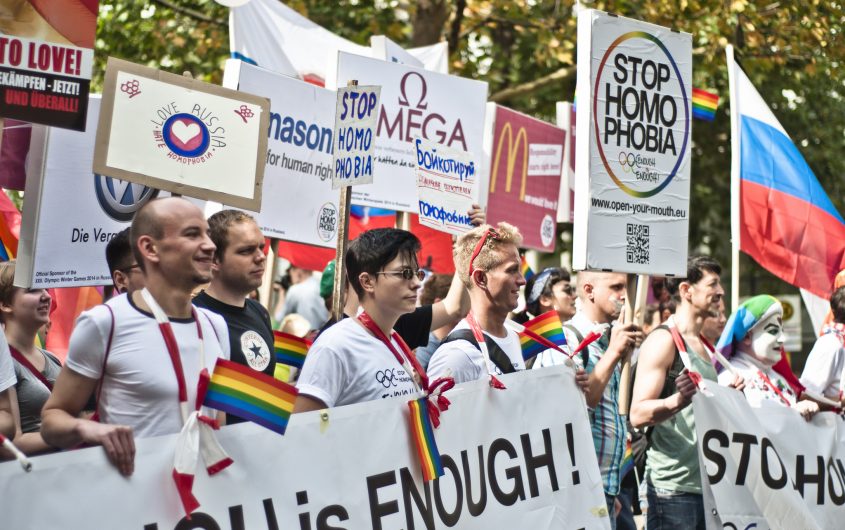
Marco Fieber via Flickr
Bridging Troubled Waters: Civil Societies in Dark Times of Transatlantic Partnership

Phillip Ayoub
Occidental College
Phillip M. Ayoub is Associate Professor of Diplomacy and World Affairs at Occidental College. His research bridges insights from international relations and comparative politics, engaging with literature on transnational politics, gender and politics, norm diffusion, and the study of social movements. Alongside several articles, he is the author of When States Come Out: Europe’s Sexual Minorities and the Politics of Visibility (Cambridge, 2016) and co-editor, with David Paternotte, of LGBT Activism and the Making of Europe (Palgrave, 2014). In 2014, he was the recipient of the American Political Science Association’s Human Rights and Politics & Sexuality section awards for Best Dissertation. The following year, he received the European Union Studies Association's biennial 2013-2014 award for Best Dissertation. He also received the 2014 Janice N. and Milton J. Esman Graduate Prize for distinguished scholarship (from Cornell University), the 2017 Best Article of the Year Award from the Council of European Studies’ Gender and Sexuality Research Network, and the 2018 Provost Award for Outstanding Early-Career Scholarly Achievement (Drexel University). Please visit www.phillipmayoub.com for further information.
He is a 2018-2019 participant in AICGS’ project “A German-American Dialogue of the Next Generation: Global Responsibility, Joint Engagement,” sponsored by the Transatlantik-Programm der Bundesrepublik Deutschland aus Mitteln des European Recovery Program (ERP) des Bundesministeriums für Wirtschaft und Energie (BMWi).
Much of the focus of our work (and that of our predecessors) in the AGI NextGen project has focused on the reconciliatory role of “good” civil society in a challenging era of frazzled relations at the leadership level of Germany and the United States. It is important to understand where the bridges that maintain positive relations across the Atlantic can be fortified. That said, I wish to use the little space I have in this article to caution that new civil society bridges may also grow exponentially—both between Germany and the United States, as well as many other states—among those that fall in line with the far-right segments of President Trump’s base (as well as those of the AfD and populist supporters of the CDU/CSU).
International cooperation by nationalist groups still rings odd to the ears. Despite the irony that nationalists can find much in common across borders, this sort of mobilization is a growing phenomenon and one that will only be emboldened by the contemporary era of nationalistic leadership in many important states across the globe. The Global Right Wing, as Cliff Bob has called it, has cooperated actively on all sorts of issues. In my area of work, transnational movements around gender and sexuality, the opposition to it has, especially in the last decade, mimicked successes of progressive global civil society. Right-wing civil society now works across borders in similar ways: finding allies in powerful states (like the current administrations in the United States or Russia), in some transnational organizations (e.g., the Catholic and Orthodox churches), and within international NGOs (e.g., the World Congress of Families).
Thus, the successes of the LGBT movement, for example, have come against a backdrop of notable crises of rights and equality that play into nationalism and populism. Looking at the rapidly improving status of LGBT rights in the United States and Germany over the last two decades (e.g., the introduction of same-sex marriage policy in 2015 and 2017) makes one optimistic for successful transatlantic cooperation on human rights generally. Yet these gains are met with a concerning trend of a globalized right-wing civil society that peddles alternative norms, especially growing out of the traditional values politics spearheaded, for example, by American Evangelicals and by the Russian government.
Contemporary world politics have created ample space for a legitimized civil society that enthusiastically builds new kinds of bridges around ultra-conservative and reactionary issues.

Contemporary world politics have created ample space for a legitimized civil society that enthusiastically builds new kinds of bridges around ultra-conservative and reactionary issues. The promotion of family values and religious liberty dominate contemporary discourses on the world stage. From Vladimir Putin’s commitment to defend states from a “Gay-European” threat, to the campaign opposing the Colombian FARC peace accord on the basis of its “gender ideology,” to the emergence of opposition to gay marriage in Manif pour Tous in France—civil society operates in an increasingly polarized world.
While we can think of this civil society being largely legitimized and motivated by Trump’s success in the United States, Germany is not immune to this same aspect of legitimization. One need only to look at Alice Weidel’s (AfD) comments saying that her being a lesbian helps to motivate her opposition to immigration, or Jens Spahn’s (CDU) gripe that he has to speak English at some Berliner cafes. Spahn, a candidate for CDU leadership, has had warm exchanges with the new U.S. Ambassador to Germany, Richard Grenell, who has stated that he “absolutely want[s] to empower other conservatives throughout Europe, other leaders.” The presence of Steve Bannon in Germany and other European states to financially prop up far-right parties and civil society with The Movement, a new foundation intended to rival the Open Society Foundations, should be deeply concerning from a civil society framework. As should the connections between U.S. Evangelicals and the small (but present) fundamentalist and conservative segments of German Protestants. Civil society opposing refugee flows across borders, chastising “gender ideology/genderismus,” and propping up white supremacy exist in both the United States and Germany.
We need to take note of these emboldened global civil societies that threaten to erode elements of the liberal world order that has shaped much of German-U.S. relations since the end of the Second World War. Supporting transnational civil society in the domain of progressive movements on migration, gender, and sexuality is something that states and citizens should be especially attuned to in these times.







